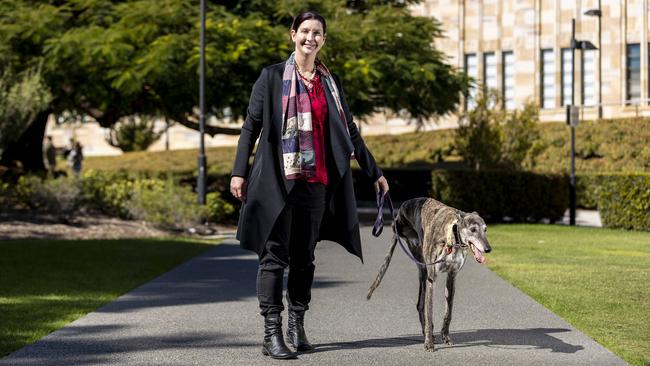Qld scientist Rachel Allavena develops canine cancer vaccine, calls for trial participation
A Queensland scientist has developed an experimental vaccine that delays cancer in dogs, and in some cases cures it completely. JOIN THE TRIALS
Pets and Wildlife
Don't miss out on the headlines from Pets and Wildlife. Followed categories will be added to My News.
A Queensland scientist has developed a remarkable experimental vaccine that delays cancer in dogs, and in some cases, kills cancerous tumours completely.
Veterinary pathologist and professor Rachel Allavena began researching how bacterial plant danger signals could be used to “wake up” animal immune systems about 10 years ago.
She discovered that when cancer tumours were injected with her experimental immunotherapy vaccine, it stimulated a dogs’ immune system which started fighting the cancerous cells, eventually shrinking or eradicating their tumour.
Terminally ill dogs began living for months longer than expected, with some living out the rest of their natural life.
“We started initially with dogs with skin and mouth tumours that could be treated and we saw remarkable results,” Ms Allavena said.
“Tumours disappeared in dogs who weren't having other treatment. Most survived months, others years.”
The discovery led to Ms Allavena trying the vaccine on dogs with aggressive bone cancer, a diagnosis that usually requires an owner to choose between intense chemotherapy treatment and putting their beloved pet down.

The trial advancement turned personal when Ms Allavena’s own pet greyhound Barney was diagnosed with a “nasty” bone cancer last August.
“My dog became the first dog in the trial,” she said.
“The whole family was so upset when he was diagnosed, he was a sweet greyhound and we really struggled with the decision to put him down or amputate (his leg).
“Mum said to me, you’re a scientist, you do research on this, so research it, and put it in place and then at least Barney’s contributing to science.
“We knew the vaccine was safe, knew that it worked, easy to administer by GP vets and owners, and it’s also safer than chemo which is quite toxic.”
Barney initially received chemotherapy, but fell extremely ill and had to cease his treatment.
He continued with immunotherapy and recovered.

Ms Allavena said the vaccine had potential to treat certain cancers in humans which share similar structure to dog cancers.
Successful trials have also been completed on horses.
The University of Queensland is now helping Ms Allavena conduct a further trial on dogs diagnosed with appendicular osteosarcoma, a common bone tumour.
Queenslanders have been invited to apply to the trial and have their sick pets treated with the vaccine.
Ms Allavena and her team of veterinarians, board-certified pathologists and clinical trial experts will then study the dogs’ immune response to the medication and attempt to advance the vaccine qualities.
To be eligible, dogs need to have been diagnosed with appendicular osteosarcoma of long bones of the limbs with no evidence of metastasis, or cancer spread, based on a physical exam and radiographs.
Pet owners can apply for the canine cancer research trial here.




